Figuring out the best diet for your betta fish can be quite a challenge.
There are many different brands and varieties of betta fish food available in pet/aquarium stores and online, but unfortunately, not all of them are high-quality or even good enough to keep your betta healthy!
|
4.8
|
4.5
|
4.7
|
If you’re struggling with what, when, or how to feed your betta fish, you’re not the only one.
Keep reading for more information on how to find the best food available for your fish, how to feed your betta a high-quality diet, and learn about all of the different types of fish foods available.
Key Takeaways
- Betta fish require a high-protein diet and cannot thrive on plant-based foods; the best options include live and frozen foods and high-quality pellets or flakes that list whole fish products as their main ingredients.
- Live foods offer nutritional benefits and encourage natural hunting behaviors but come with the risk of parasites. However, culturing your own live foods or buying from reputable stores can mitigate that.
- Overfeeding can lead to obesity and water pollution; it’s recommended to feed bettas small amounts 2-3 times a day and to remove any uneaten food promptly to maintain water quality.
What Is the Best Food for Your Betta Fish?
The most important thing you need to keep in mind when you’re looking for the best possible betta fish food is that these fish are naturally carnivores that require a lot of protein in their diet to remain healthy and thrive.
The betta’s upturned mouth reveals what they eat most in the wild: water-bound insects and insect larvae, and those floating on the surface.
Betta fish can’t survive on plant-based foods alone, and contrary to what some fish stores will tell you, they do not eat plant roots. The best betta fish diet should include a variety of freeze-dried foods, live foods like mosquito larvae, brine shrimp, and bloodworms, and betta flakes and/or pellets that are high in crude protein.
Betta Fish Flakes and Pellets
Most betta fish keepers choose a high-quality pellet or flake food as a staple diet for their pets, though it is not uncommon for betta fish to refuse flakes. Remember that betta fish tend to be messy eaters, and any uneaten food will sink to the bottom of the tank, where it will gradually decompose and compromise the water quality. So, be sure you remove any excess food as soon as you see that your betta has finished eating.
It is also important to buy fish food that is specifically meant for betta fish. Betta fish food is exceptionally high in crude protein, and tropical fish flakes won’t give your betta the nutrients it truly needs to thrive.
Because feeding nothing but this staple food wouldn’t make for the best diet, it’s a good idea to include a few other foods in your betta’s diet.
Live Food
Some betta keepers choose to feed live foods that are usually sold at fish stores, the most popular including brine shrimp, mosquito larvae, and bloodworms.
While this food will make your betta fish get some activity (betta fish feeding can be very exciting to watch!), you are also introducing the risk of bringing parasites into your tank. Because of this threat, it is never advisable to feed your betta fish anything that you may have found outside.
The best way to have a steady flow of reliable live foods to feed your betta fish is by culturing them yourself. For safe and fun live betta food, you can try hatching your own brine shrimp eggs or wingless fruit flies.
The second best way to get reputable live foods is by shopping at the best reputable fish stores. Many times the food you are buying is the same food they use to feed their fish; if it isn’t, don’t be afraid to ask why they might be feeding something different.
Reddit contributor mariathecrow suggests taking the following approach to feeding her betta live foods:
Sometimes I feed them crickets. Go to the pet store and find the tiniest pinhead crickets that you can find and get a few. They drown easily, so put them in one at a time, but my bettas LOVE them!
I’ve also tried blackworms, and tiny earthworms can be a treat as well. These are also free since you can just find them in the garden. Just never collect food for any pet from an area that has been sprayed for fertilizer or pesticides!
Frozen food
There are plenty of frozen fish food options available.
I personally always have at least two types of frozen food (white/black mosquito larvae, bloodworms, brine shrimp) lying around to offer my betta fish variety from time to time. These foods make a great betta meal when thawed properly and are easy to store!
For the most part, any fish food that comes live also comes frozen; there is just the convenience that frozen foods last longer and can be better rationed at feeding time.
Whether it’s brine shrimp, bloodworms, or mosquito larvae, make sure to follow the instructions on the back of the package before throwing the cube into the tank water! Typically you will want to take some water out from your tank, put the cube in, and wait for a few minutes until the cube starts to dissolve and fall apart.
Never use tap water during this process as that will indirectly add nutrients and heavy metals into your tank water that you may not want, affecting your overall water quality and the health of your fish!
One of the main problems fish enthusiasts run into is that frozen food can be messy; these cubes surprisingly contain a lot of food, and it’s easy for pieces to be quickly carried away by the water current under decorations and into the filter.
It is best if you turn all equipment off during feeding time so that you can remove any excess food to prevent leftovers from breaking down and causing future water quality issues.
Freeze-Dried Food
If your betta fish doesn’t eat fish flakes and you don’t have access to live foods or frozen foods, there is always the last alternative: freeze-dried foods. These foods will typically be the same, with a selection of bloodworms, mosquito larvae, and brine shrimp, but all of the moisture has been removed.
While freeze-dried foods are an easy alternative, they don’t always provide the best supplementation because so much nutritional value has already been taken; there is also a common issue that these foods tend to expand in the gut of the betta fish after being eaten, causing your fish to bloat or become constipated possibly.
The simple fix to this is soaking the pieces of food in tank water or other prepared liquid before feeding. However, you never have to worry about introducing parasites into your tank, and it’s an easy food to give if you don’t have many other options!
High-Quality Betta Food
With all the betta fish foods that all claim they are the best, it can be difficult to figure out which one to buy. Luckily, the ingredient list can tell you a lot!
As mentioned before, betta fish are carnivores that need a very high protein diet. However, protein-based ingredients, like fish, are quite expensive, more expensive than cheaper plant-based ingredients like wheat or soy.
Many manufacturers of betta food, therefore, choose to use more plant-based ingredients and other cheap options like fishmeal instead of using whole fish; fishmeal is all the leftover bits that fisheries don’t have any other use for after all the quality pieces have been sold to market.
The downside of this, of course, is that the food is not the absolute best that it could be for your betta.
A betta food that lists more plant-based ingredients and fishmeal at the top of the ingredient list is bad quality, and you should avoid it. A betta food that lists “whole” fish products as the first few ingredients is a better idea and will lead to a much healthier fish.
An example of a popular and good-quality staple fish pellet is the New Life Spectrum Betta Formula.
Note: many websites list that flakes are not good betta food. This is because many flakes are of bad quality and contain too many plant-based ingredients and fillers.
However, not all flakes are inherently bad: the same rules apply, and there is nothing wrong with high-quality betta flake food.
The 5 Best Betta Foods
In this part of our guide, we review the five best betta foods currently available on the market.
Summary Table
| Food Product Name | Type | Main Ingredients | Nutritional Highlights | Additional Notes |
|---|---|---|---|---|
| New Life Spectrum Betta Formula | Pellet | Antarctic krill, herring, squid, New Zealand mussel protein | 37% crude protein min, 5% crude fat min, 4% crude fiber max | Made in the USA, it enhances color, and contains garlic for immunity |
| Northfin Food Betta Bits | Pellet | Whole Atlantic krill meal, whole sardine meal, organic kelp | 45% crude protein min, 5% crude fat min, 5% crude fiber max | Slow sinking, easily digestible, high in Omega 3 & 6 |
| Omega One Betta Buffet Flakes | Flake | Salmon, whole herring, whole shrimp, kelp | 43% crude protein min, 12% min. crude fat, 2% crude fiber max | Rich in Omega 3 & 6, natural beta carotenes for color |
| Hikari Betta Bio-Gold Baby Pellets | Pellet | Fish meal, wheat flour, soybean meal, rice bran, krill meal | 38% crude protein min, 4.0% crude fat min, 3.0% crude fiber max | Contains artificial coloring, a balanced diet |
| Fluval Bug Bites Tropical Fish Food | Granule | Black soldier fly larvae, salmon, fish protein concentrate | 40% crude protein min, 12.5% crude fat min, 5.0% crude fiber max | Nutrient-rich larvae as the main ingredient |
| Live Foods | Live / Frozen | Brine shrimp, mosquito larvae, bloodworms | High protein, natural diet | Risks of parasites; culturing live foods is recommended |
New Life Spectrum Betta Formula
- New life spectrum is made from quality natural ingredients
- Extreme color enhancement and vitality in your fish
- Made in the USA
New Life Spectrum Betta Formula semi-floating pellets are the perfect food for a balanced diet.
These small pellets (<1 mm) are made from Antarctic krill, herring, squid, New Zealand mussel protein, seaweed, kelp, microalgae, natural spirulina, as well as fruit and vegetable extract. This includes garlic which can help bolster immunity.
The guaranteed analysis reads:
- 37% min. crude protein
- 5% min. crude fat
- 4% max. crude fiber
- 10% moisture
- 8% ash
- 8000 IU/kg Vitamin A
- 2500 IU/kg Vitamin D
- 200 IU/kg Vitamin E
These pellets can sometimes be too big and hard for some betta fish to eat, so hobbyists soak them before feeding. Otherwise, the ingredients on the packaging are recognizable, and guaranteed analysis meets our standards for a healthy betta.
Northfin Food Betta Bits
- Slow Sinking 1 Mm Pellets Are Perfectly Sized For Your Bettas
- Easily Digestible To Promote Optimal Nutrient Absorption
- All Marine Protein Based Diet Produces Less Waste And It Leads To A Cleaner Aquarium For Longer Periods Of Time
Northfin is a lesser-known aquarium brand that has delivered high-quality equipment and supplies for years. This includes their food for betta fish.
Northfin Food Betta Bits is expensive but one of the best foods you can get for your betta fish. They are comparable to New Life Spectrum Betta Formula pellets but sink faster.
The ingredients include whole Atlantic krill meal, high omega-3 DHA herring meal, whole sardine meal, and wheat flour. For a balanced diet, Northfin Food Betta Bits also includes organic kelp and spirulina, as well as garlic for bolstered immunity.
The guaranteed analysis reads:
- 45% min. crude protein
- 5% min. crude fat
- 5% max. crude fiber
- 9% moisture
- 9% ash
- Vitamin A acetate
- Vitamin B12 supplement
Northfin Food Betta Bits is very high in protein, so feedings should be spaced out. However, these floating pellets are perfectly sized and easy on betta digestive systems.
Omega One Betta Buffet Flakes
- 100% meal free
- Rich in critical Omega 3 & 6 Fatty Acids
- Natural beta carotenes in salmon provide extreme color enhancement
- Naturally insoluble, reducing water pollution
If your betta fish doesn’t like pellets, then Omega One makes a great flake alternative.
The first few ingredients listed on Omega One Betta Buffet Flakes are identifiable salmon, whole herring, wheat flour, and whole shrimp. There is also some protein from greens, including pea protein, kelp, and spirulina, for a natural diet.
The guaranteed analysis reads:
- 43% min. crude protein
- 12% min. crude fat
- 2% max. crude fiber
- 8.5% moisture
- 8% ash
- Vitamin A Supplement
- Vitamin B12 Supplement
- Vitamin E Supplement
This product may contain artificial coloring and can be high in protein for betta fish so it may be best used as a regular supplement. However, this food is packed full of natural proteins that help keep betta fish strong and happy.
Omega One Betta Buffet Flakes are also available in pellet form.
Hikari Betta Bio-Gold
- Scientifically Developed Diet For All Types Of Bettas
- Optimally Balanced Nutrition Bettas Require
- Contains Ingredients Uniquely Beneficial To Bettas
Hikari makes feeding your betta fun. Not only is Hikari Betta Bio-Gold innovatively designed to dispense pellets, but it’s also good food for your fish!
Hikari is a very popular aquarium brand, and its products live up to expectations for the most part.
While high-quality and rich in protein, the first ingredient of Hikari Betta Bio-Gold is fish meal. This is followed by wheat flour, soybean meal, rice bran, potato starch, and eventually, krill meal.
The guaranteed analysis reads:
- 38% min. crude protein
- 4.0% min. crude fat
- 3.0% max. crude fiber
- 10% max. moisture
- 12% ash
- 0.7% min. phosphorus
- 19,000 IU/kg Vitamin A
- 2,900 IU/kg Vitamin D3
- 1,500 IU/kg Vitamin E
These floating pellets are fun to feed as long as you’re able to get them out of the packaging. They also contain artificial coloring so that they may serve better as an occasional treat.
Fluval Bug Bites Tropical Fish Food
- Tropical fish food that contains up to 40%, nutrient-rich Black Soldier Fly Larvae, the first ingredient
- High in multiple proteins like whole salmon – rich in Omega 3 and 6 for healthy skin, scales and fins
- Fortified with essential vitamins, amino acids and minerals for a balanced daily diet
If you’re looking for something different to feed your fish, then Fluval Bug Bites Tropical Fish Food might be your betta’s new favorite food.
Fluval Bug Bites Tropical Fish Food is exactly what they sound like pieces of bugs. These small granules are made from black soldier fly larvae, salmon, fish protein concentrate, green peas, and potatoes.
The guaranteed analysis reads:
- 40% min. crude protein
- 12.5% min. crude fat
- 5.0% max. crude fiber
- 10% moisture
- 9% ash
- 1.5% min. calcium
- 0.8% min. phosphorus
- 2,500 IU/kg Vitamin A
- 2,400 IU/kg Vitamin D3
- 75 IU/kg Vitamin E
These bug bites are naturally made and packed with protein. The unusual ingredients can help introduce a new source of food to hungry bettas.
How Much and How Often Should You Feed Your Betta?
Bettas are small fish that don’t need a lot of food, especially if you are feeding high-quality food. Two or three pellets/worms/etc. are enough for a day, although you can vary the frequency of feeding and the amount of food you give each time; skipping a day every once in a while is fine, and so is feeding twice on some days or dividing the food into 2-3 meals.
If your betta happens to be refusing food because of stress due to transport or illness, don’t worry. A few days without eating won’t do much harm.
If the fish is stressed from transport, leave the lights off to reduce stress and try again in a few hours with some worms instead of the less tasty-looking pellets.
If there doesn’t seem to be anything outwardly wrong with your betta fish and you haven’t transported it recently, check that the water parameters and temperature are correct; of course, there are days when your betta fish may just not want to eat, but this shouldn’t last for more than a day otherwise.
How to Not Feed Your Betta Fish
Keeping your betta fish well-fed and happy may seem easy, but there are quite a few (beginner) mistakes to avoid! These are a few of them:
- Don’t follow the ‘feed as much as your fish can eat in five minutes’ rule. Betta fish (and other fish) will almost always accept food even when they’re not hungry, so this is a one-way ticket to an obese fish.
- Don’t reward jumping behavior with food. It’s very interesting and exciting to watch a betta jump for food, but it’s quite dangerous as the fish could accidentally jump out of the aquarium or hurt itself on the lid.
- Don’t use holiday/weekend fish food blocks when you are planning to go away for an extended amount of time; these can quickly malfunction and pollute the water, leaving you to come home to murky water and, most likely, a dead fish. As long as your betta is well-fed, a few days without food are harmless. If you are going to be gone for more than a few days, it may be worthwhile to have someone keep up with feeding your betta on its regular schedule.
- Don’t leave uneaten betta fish food in your aquarium; remove it immediately. Rotting food can cause bad water quality and will eventually become very dangerous to your betta as ammonia builds in the tank.
- Don’t feed too much freeze-dried food. It’s fine as a snack from time to time, but it’s known to cause constipation and other problems when fed regularly.
- Don’t thaw and re-freeze frozen food. This promotes explosive bacteria growth! Any leftover thawed food should be disposed of and not fed to your betta.
Why Does My Betta Fish ‘Throw Up’ Its Food?
You may have experienced your betta fish ‘throwing up’ its food; there are a few reasons why this may be happening, and most of the time, it’s actually because of the betta fish!
You could be feeding your fish the best betta foods available, but honestly, some bettas are just that picky. Many betta fish were raised eating one type of food at the store and are reluctant to try anything else initially.
If your betta still refuses to eat after a couple of days, there are a few ways to get around this problem.
The first method you could try is by offering live food, especially bloodworms. Most betta fish won’t say no to a couple of bloodworms! However, try to avoid feeding bloodworms too often as they do not have the best nutritional value and can be risky (and expensive) to feed, as mentioned before.
The second way is by making the betta fish food more appetizing. Many hobbyists soak their betta foods in a garlic mix, such as Garlic Guard, when they have a picky eater. This seems to spark their appetite just fine!
Lastly, your betta may be spitting out its food because the food is simply too big to swallow. You can try cutting up the pieces even smaller or soaking them in the garlic mix to help break them up.
If none of these methods work, your betta may have an underlying illness or parasites or may even be constipated.
Continue to monitor your betta for any other signs of distress and treat accordingly. There are a few ways to treat a constipated betta either through peas or fasting, though it is best to do some research and keep trying until your betta gets better!
Conclusion
Your betta’s diet is the key to having a healthy and colorful fish. There is a large selection of betta fish food out there, and a lot of it is not actually what your betta needs to thrive. Before picking up fish food, take some time to read the ingredients list on the back and ask yourself:
- What is the first ingredient listed?
- Is this food specifically betta fish food, or is it meant for tropical fish?
- How can I offer my betta variety?
As long as you don’t overfeed, your betta will be very appreciative of the different foods you give!
If you have any questions about finding the best betta food, the different types of betta food available, or have other betta fish feeding concerns, don’t hesitate to leave a comment below!

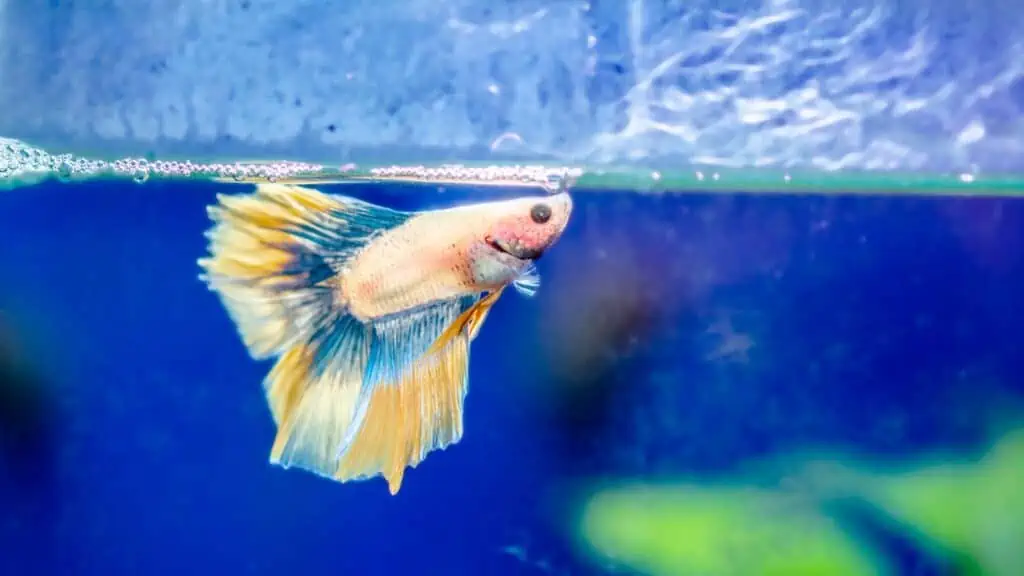




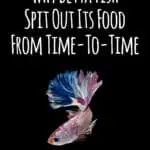


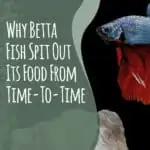
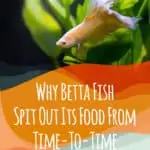


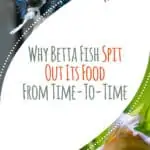
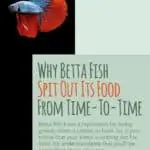
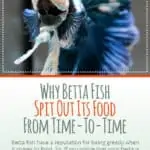

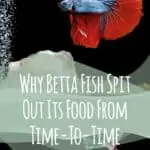
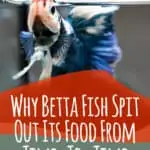
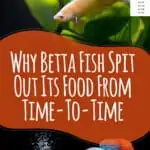
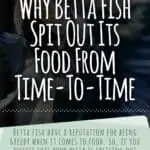
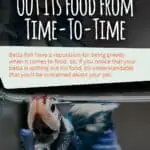
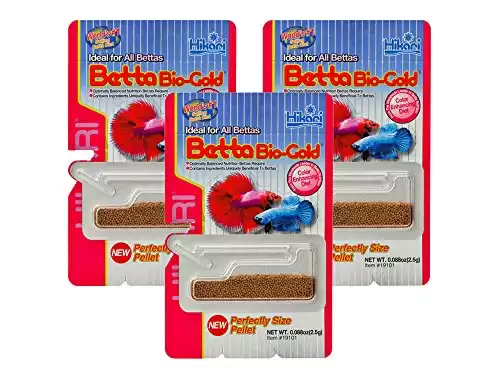
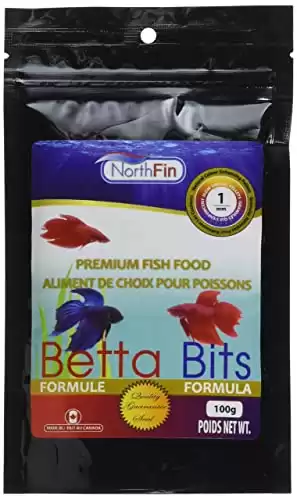
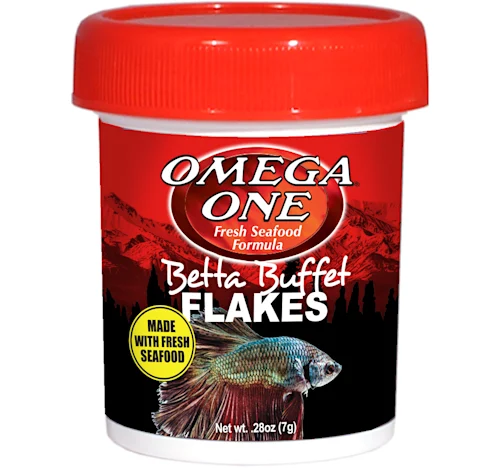



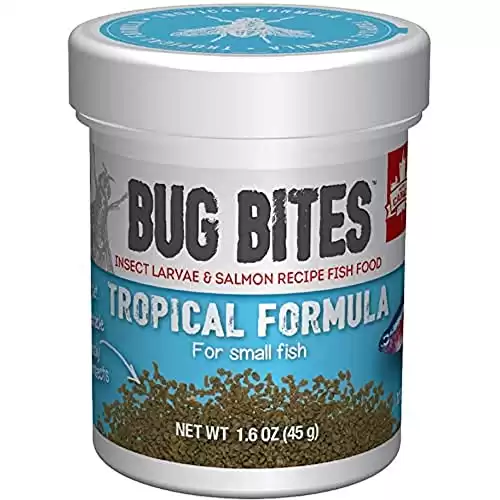

Hi, I don’t know if you are still responding since this is such an old article but I got a beta fish a few months ago on Christmas and I am feeding him the Top Fin Beta Fish Food. Is that healthy for him? I think the top ingredient is fish meal. Can you help?
Hi Emma!
It is best to get a food that has specific, identifiable ingredients. I recommend New Life Spectrum Betta Food or Northfin Betta Bits.
I just recently got a betta on Thursday. I bought Omega Betta Buffet Pellets, Omega One Freeze-Dried Brine Shrimp, and Omega One Freeze-Dried Bloodworms. I’m still confused on how many pellets to feed him and when to give him the brine shrimp and blood worms or if I should feed the supplements with the pellets together. Any help appreciated!
And he is already bloated, I’ve been giving two pellets every morning and two every night.
Hey Stephanie!
It’s kind of hard to go wrong feeding your fish. Start with 2-5 pellets a day. You can give brine shrimp/bloodworms 1-2 times a week instead of the pellets. Bettas will eagerly eat anything you give them, so don’t give in to their begging!
hi i am new to the hobby but after you transport your fish should i feed them or wait till the next day
Hey Brett!
It’s probably better to wait until the next day.
Really informative blog. Have you ever had a problem with your betta spitting up food?
Hey Arthur!
I haven’t personally had problems with this, and it’s usually nothing to worry about. Most times, the size of the food is just too big, so try cutting it up and see if that helps. Your betta might not like the food either, though that’s usually followed by them completely ignoring it in future feedings.
Hi,
I bought a king Betta, he ate on the first night but after that he hasn’t eat anything in 7 days already no matter what type of food I gave it to him. I live in 5 gallon tank, temperature only able to go up 76 degree (first night we didn’t have heater for him so the water was pretty cold). Do you know what’s going on with him, I don’t want him to die. The reason why I got him was to free him from the small cup he was in but I don’t want him to die in my watch. I tested the water and Pet store said it was good. Help
Thank you
It’s hard to tell without knowing your full tank setup and being able to see the fish. Pet store tests are often unreliable and you should get your own test kit as soon as possible.
76 degrees is a little low for bettas, but not enough to make him lethargic or disinterested in food. I would test the water parameters when you can, keep an eye out for disease/illness, and offer live food; if he was on a live food diet before, he might not be familiar with what you’re trying to feed now.
I have been using a heating pad along the back of the tank, I only use the warm and the low settings and it seems to work. I only turn it on when I feel the temperature in the house is a little cooler than normal usually on rainy days. I am actually not sure how good it is for ‘fish face’ to not have a consistent temperature, but until I can afford a little tank heater this will have to do. He seems to be doing great though when I first brought him home he was a little pale, but now( 2 weeks later) he has beautiful solid, vibrant colors.
This isn’t ideal and I think I’d be more worried about the electricity + water combination, but as you said if it works it works.. sometimes heaters aren’t as reliable either. Just try to get a quality aquarium heater soon! For your sake and the fish’s!
Hello!
My daughter received a female betta as a gift for Easter and I’ve read your article because I know they can be very temperamental and I need some advice. Forgive me if you went over some of this in the article (it’s a lot to take in)
I’m glad you pointed out that they need variety and not just one food. It seems like besides live, frozen is the best. Then freeze dried, then pellets? I looked at the omega one freeze dried bloodworms and my question is is it better to have the crude protein, fat and fiber as opposed to bloodworms only? Normally when I see extra stuff on the ingredients I feel like it’s not good for some reason. I do want to get her some frozen as well so should that have the crude protein and everything?
Also I was wondering if the new life spectrum is mostly for everyday and the freeze dried worms/ brine shrimp for snack only? Do you have another suggestion for everyday?
And lastly how often should I feed her?
I know it’s a lot but I kinda feel bad for her, her cage is so small and she’s not eating and the water smells so I really wanna do all I can to take care of her. Especially her diet
Thank you!!!
Hi Ashley!
Great job for taking the time to research! Betta fish might seem hard to take care of at first, but luckily, a lot of products are made specifically with their needs in mind so it cuts down on some of the options.
A quality flake or pellet-based diet is best and will save some money as frozen and live foods can become very expensive over time.
New Life Spectrum is a very popular flake/pellet option. Omega One is another. The main thing you want to look for in foods is high protein and real ingredients; things like krill and shrimp should be the first ingredients listed.
Pellets are a little easier to ration than flakes, but both will work well and can be fed once or twice a day. Bettas can be greedy, so only give a small pinch/1-3 pellets at a time.
While your fish will love most frozen foods, like bloodworms, you don’t want to give your fish too much as they lack a lot of important nutrients. They should only be given as a snack and about once every week or so.
More importantly, work on getting at least a 5 gallon aquarium, a heater, and getting into a routine of doing regular water changes. It might seem hard to set up at first, but after a while, the tank will start to regulate itself. And as always, don’t hesitate to ask us questions!
I hope this helped. Good luck!
A tip if you want to feed frozen. Get the individually wrapped “gumdrops” they stay fresh longer since the bettas eat so little. Use a sharp knife to carefully shave a tiny amount into a cup (put the rest in a zip bag and back in the freezer immediately), defrost with tank water, then use an eyedropper to gently lay it on the surface of the water. It lays there due to surface tension instead of blowing everywhere. If you gently tap the top of the tank every time you can train your betta to come to you to be fed which also reduces waste and ensures they actually get the food. The larger the tank the more important to ensure they are eating, most won’t eat off the ground.
Yes! This is a great tip. Frozen food can definitely be difficult to gauge how much there actually is in a serving. I’ve had to scoop out food too many times just because I underestimated it.
Another issue I have noticed with cheaper prepared betta pellets is that they are too large for the betta to eat. I’ve fed hikari for years but for some reason there was a shortage of them earlier this year… I had to go through multiple brands to find one small enough and finally wound up feeding micro pellets for tetras for the period it took for more of the usual food to come in stock.
That’s definitely interesting! I wonder if it has to do with fillers vs. protein percentages or something like that. If you do find yourself with larger pellets again, you can always try to cut them in half!
Hi, I know this is an older article, but I was wondering your thoughts on pre-soaking pellet foods for bettas? I recently adopted a betta and he seems to spit out his pellets a few times before eating them. Should I be soaking them a bit before feeding him?
Thanks for the amazing resources you’ve put together! It’s tough sorting through all the misinformation online about fishkeeping, and I’m so grateful to have found your site!
Hello! Yeah, I found the same thing with my Betta. There is discussion on the topic because pellets are said to lose their nutrients when soaked. However, there’s a good way around this if you want to be sure things are fine: use a vitamin supplement for aquarium fish in the soaking water. They do seem to prefer their pellets soaked, so go right ahead.
PS. Always feel free to comment on older articles, I’m still here answering, posting and updating. 🙂
Hello!
I find your posts very informative, but I’d like to add (for anyone reading the comments) that most betta pellets or flakes include an ingredient called “Ethoxyquin” which is a cheap preservative that can cause health issues for bettas in the long run.
Thanks for sharing, definitely something to keep in mind!
So is it okay to feed your betta just brine shrimp or should it be pellets with the occasional brine shrimp or just pellets? I have yet to get my betta but I would like to have the best info before i go shopping XP!
Nope, definitely not just brine shrimp! Those are quite fattening so best used as a snack. The New Life Spectrum food linked to in the article is a good staple option. 🙂
Should bettas be given floating food? Will they dig in the gravel for food that has fallen to the bottom?
Floating food!
I have a double take male betta fish and I am getting really scared, he has been laying around his tank, on the bottom, on plants, he even sometimes floats on the top. I read somewhere that too much protein can cause constipation which can kill them and his food is 38% protein. Could it be that? Please help I’m scared for him
I really can’t answer any questions about fish health without information about your water values and tank setup, sorry! Floating can have many causes so more info is really needed.
Hi, I have a halfmoon giant betta. I’m wondering if I can have more info about it. Where did they originate? How much food do I give him? I read somewhere that they lives are shorter than normal sized bettas. Is it true? I’ve had bettas before but this one is my favorite. He’s big and beautiful I named him bigboy. Thank you in advance for the info!
Hi! I’m not 100% sure, but like other betta varieties, I think Giants were first bred in Asia. As for food, you could probably give a little more than a regular betta – an extra pellet now and then, for example. I’m not sure about shorter livespans, but more extreme betta varieties do often live shorter lives. Giants might have the same issues.
Good luck with your fish! 🙂
Great info, & a lovely Betta eatn the brine shrimp. I have a beautiful Blue double tail male & I love him so much! I almost list him by feeding him tropical fish flakes, as I had him in with 2 platy’s. Bad idea as he seemed stressed by their presence, but loved eating their babies. I watched my Pertty-Boy, his name, turn into a lion! He tracked & flushed those babies right out of their hiding place. He now is in a 5 gallon tank alone & is doing much better. I feed him the instant brine shrimp & a thawed pea to keep him regular. He has gotten constipated & started floating on his side & struggled to swim down in the tank. I’m so happy to report he is thriving! Thanks for your info, it is really important what you feed this beautiful creatures. They are so much more than just a fish!
Hi! Glad to hear your betta is doing better, that does sound like a much more suitable setup. 🙂 As for the food, just regular high-quality betta pellets and frozen foods (such as brine shrimp) are best. The pea thing is actually a myth and peas are not suitable as goldfish food! Daphnia is said to be a better option for constipated fish.
Good luck!
This was very informative. I had a Betta a year or two ago. I haven’t gotten another one just yet but I didn’t know about the other food types. Also thought he liked the floating pellet food. Have a few fancy guppies now, so I don’t think a Betta would work too well.
Hi! Glad you liked the article. Most bettas do like and eat floating pellet food and it’s not bad for them if you buy high quality food, you just need to supplement it with other choices! Bettas and fancy guppies are indeed a pretty bad combo, so you’re right it’s a better idea to wait. Good luck if you do ever decide to get another betta though 🙂